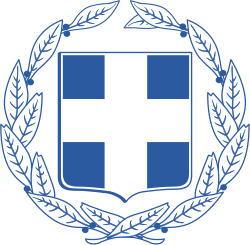Court of Cassation (Greece)
| Court of Cassation | |
|---|---|
| Άρειος Πάγος | |
| Established | 1834 |
| Country | Greece |
| Location | Athens, Greece |
| Website | www.areiospagos.gr |
| President | |
| Currently | Vassiliki Thanou-Christophilou |
| Since | 1 July 2015 |
The Court of Cassation (Greek: Άρειος Πάγος, Areopagus, i.e. the "Stone, or Hill, of Ares") is the supreme court of Greece for civil and criminal law. The Court of Cassation's decisions are irrevocable. However, Greece being a member state of the Council of Europe, cases ruled by the Greek Άρειος Πάγος can still be brought to the European Court of Human Rights. If the Court of Cassation concludes that a lower court violated the law or the principles of the procedure, then it can order the rehearing of the case by the lower court. It examines only legal and not factual issues and it is the highest degree of judicial resort. The court consists of the president and the attorney-general, ten vice-presidents, fifty five areopagites and fourteen deputy attorneys-general. The members of the Supreme Court enjoy functional and personal independence, as do all members of the judiciary, and are members for life, but they are required by law to retire at the age of 67 (article 87 paragraph 1 and article 88 paragraphs 1 and 5 of the Constitution of Greece).
History
 |
| This article is part of a series on the politics and government of Greece |
The Areios Pagos is named after the first court of androfonies (crimes of murder), founded somewhere between 1500-1300 BC by Theseus and King Cecrops, which was situated on the rocky hill named after the god Ares in Athens. This highest court of antiquity was named the Areios Pagos Parliament and consisted of members for life, the Areopagites, who held all powers. In 462 BC a great part of the administrative and judicial powers was conveyed to the Heliaia, the 'Parliament' and the Ekklesia (public assembly). The institution was copied in many Greek city-states, and survived until well into the late Roman period, when the cities' internal autonomy was curtailed.
On 16 October 1834, the Areios Pagos was founded as the supreme court of modern independent Greece by royal decree. Instead of receiving the name Court of Cassation, it was finally decided for the supreme court to be named in honor of its ancient equivalent. The first supreme court justices were nominated on 13 January 1835 by royal decree. The first president of the supreme court was Christodoulos Klonaris (1788-1849), attorney at law in the city of Nafplion and the minister of justice in the government of Ioannis Kapodistrias. The first attorney-general was Andronikos Paekos, who until then was the presiding judge of the temporary court of Missolonghi.
Among the areopagites there was also Anastasios Polyzoidis, until then presiding judge of the temporary court of Nafplion, famous for his refusal, along with fellow judge Georgios Tertsetis, to sign the conviction of the hero of the Greek Revolution, Theodoros Kolokotronis.
The first case of the Supreme Court (1/1835) was heard on 30 April 1835 and the decision was published on 1 May 1835.
List of Presidents
- Christos Klonaris (1835–1847)
- Yannis Somakis (1847–1848)
- Christos Klonaris (1848– 1849)
- Georgios A. Rallis (1849–1861)
- Aris Moraitnis (1861–1872)
- Dimitrios Valvis (1872–1885)
- Nikolaos Deligiannis (1885–1891)
- Konstantinos Simantiras (1891–1911)
- Christos Kapsalis (1911–1921)
- Spiridon Tsagris (1921–1922)
- Georgios Panapoulos (1933–1941)
- Konstantinos Kyrillopoulos (1941–1945)
- Yannis Sakketas (1945–1948)
- Ilias Papailiou (1948–1953)
- Christos Stavropoulos (1953)
- Yannis Apostolopoulos (1953–1959)
- Konstantinos Kafkas (1959–1963)
- Stylianos Mavromichalis (1963–1968)
- Theodoros Kamperis (1968–1969)
- Athanasios Georgiou (1969–1970)
- Vasilios Patsourakos (1970–1973)
- Lisandros Kanellakos (1973–1974)
- Dimitris Margellos (1974–1975)
- Konstantinos Zacharis (1975–1976)
- Spiridon Gaggas (1976–1977)
- Georgios Karamanos (1977–1978)
- Spiridon Kollas (1978–1979)
- Dimitrios Skoumpis (1979–1982)
- Georgios Konstas (1982–1985)
- Antonios Stasinos (1985–1989)
- Ioannis Grivas (1989–1990)
- Vasilios Kokkinos (1990–1996)
- Stefanos Matthias (1996–2002)
- Georgios Kappas (2002–2005)
- Romilos Kedikoglou (2005–2007)
- Vasileios Nikopoulos (2007–2009)
- Georgios Kalamidas (2009–2011)
- Rena Asimakopoulou (2011– 2013)
- Michail Theocharidis (2013–2014)
- Athanasios Koutromanos (2014–2015)
- Vassiliki Thanou-Christophilou (2015–present)
References:[1]
See also
References
- ↑ "Former Presidents". Court of Cassation. Retrieved 26 August 2015.
External links
Coordinates: 37°59′22″N 23°45′12″E / 37.9895°N 23.7533°E